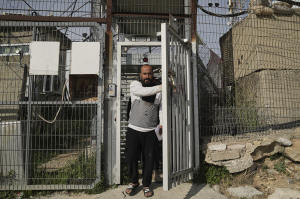Oscar-winning Palestinian director says Israeli soldiers beat him after
attack by settlers
[March 26, 2025]
By JULIA FRANKEL
HEBRON, West Bank (AP) — Only a few weeks ago, Hamdan Ballal stood on a
stage in Los Angeles accepting an Oscar for the film “No Other Land,” a
documentary depicting his West Bank village’s struggle against Israel’s
occupation.
On Tuesday, Ballal – his face bruised and clothes still spotted with
blood – recounted to The Associated Press how he was heavily beaten by
an Israeli settler and soldiers the night before. The settler, he said,
kicked his head “like a football” during a settler attack on his
village.
The soldiers then detained him and two other Palestinians. Ballal said
he was kept blindfolded for more than 20 hours, sitting on the floor
under a blasting air conditioner. The soldiers kicked, punched or hit
him with a stick whenever they came on their guard shifts, he said.
Ballal doesn’t speak Hebrew, but he said he heard them saying his name
and the word “Oscar.”
“I realized they were attacking me specifically,” he said in an
interview at a West Bank hospital after his release Tuesday. “When they
say ‘Oscar’, you understand. When they say your name, you understand.”
The Israeli military did not immediately respond to the claims that
Ballal was beaten by soldiers. The settler whom Ballal identified as his
attacker, Shem Tov Luski — who has threatened Ballal in the past —
denied he or the soldiers beat him and told the AP that he and other
Palestinians in the village had thrown stones at his car. He said he
didn't know Ballal was an Oscar winner.
The Israeli military said Monday it had detained three Palestinians
suspected of hurling rocks as well as one Israeli civilian, who was soon
released. Ballal denied throwing stones.

‘I’m dying!’
The attack took place Monday night in the southern West Bank village of
Susiya. It’s part of the Masafer Yatta region featured in “No Other
Land,” which depicts the Palestinian residents’ attempts to fend off
settler attacks and the military’s plans to demolish their homes.
At around sunset, as residents were ending their daylong Ramadan fast,
roughly two dozen Jewish settlers along with police entered the village,
throwing stones at houses and breaking property, witnesses say. Around
30 soldiers arrived soon after. Jewish Israelis in an activist group
supporting the villagers showed video of themselves also being attacked,
with settlers hitting their car with sticks and stones.
Ballal said he filmed some of the damage caused by the settlers. Then he
went to his own home and locked it, with his wife and three young
children inside.
“I told myself if they will attack me, if they kill me, I will protect
my family,” he said.
Ballal said Luski approached with two soldiers. He said Luski hit him on
the head, knocked him to the ground and kept kicking and punching him in
the head. At the same time, one soldier hit him on the legs with his gun
butt, while the other pointed his weapon at him, he said.
Lamia Ballal, the director’s wife, said she was huddling inside with
their children and heard him screaming, “I’m dying!”
Luski told the AP that he and other settlers had come to the village to
help a fellow settler who said he was being attacked by Palestinian
stone-throwers. He said dozens of masked Palestinians attacked his car
with stones, including Ballal. "He broke my window, threw a stone at my
chest,” he said.
He said when soldiers arrived, he led them to Ballal's house to identify
him as one of the attackers but denied that he hit him or that settlers
attacked any property in the village. Luski said he had footage of the
night’s events but when asked to show it to the AP, he responded with a
string of expletives.
On Tuesday, a small bloodstain could be seen outside Ballal's home, and
the family car’s windows were shattered. Neighbors pointed to a nearby
water tank with a hole in the side that they said had been punched by
the settlers.
Detention
Lea Tsemel, the attorney representing Ballal and the two other
Palestinians detained with him, said they were taken to an army base,
where they only received minimal care for their injuries from the
attack. She said they had no access to them for several hours after
their arrest.
[to top of second column]
|

Hamdan Ballal, Oscar-winning Palestinian director of "No Other
Land," is released from a police station in the West Bank settlement
of Kiryat Arba a day after being detained by the Israeli army
following an attack by Jewish settlers, Tuesday, March 25, 2025. (AP
Photo/Leo Correa)
 Ballal said he had no idea where he
was being held, could see nothing and was “freezing” from the hours
spent blindfolded under the air conditioner.
The three were transferred to an Israeli police station at the West
Bank settlement of Kiryat Arba and were released Tuesday afternoon.
“All my body is pain,” he told the AP immediately after his release
as he walked, limping, toward a hospital in the nearby Palestinian
city of Hebron.
Doctors at the hospital said Ballal had bruises and scratches all
over his body, abrasions under his eye and a cut on his chin but no
internal injuries. The two other detained Palestinians also had
minor injuries.
Confrontations with settlers
In a widely circulated video from August, Luski and several other
masked settlers are seen arguing with Ballal. Luski shouts profanity
at him and tries to provoke him into a fight.
“This is my land, I was given it by God,” Luski says. “Next time it
won’t be nice.” He taunts Ballal with the prospect of being sent to
Sde Teiman, a notorious military prison holding Palestinians
detained from Gaza, where five soldiers have been charged with
raping a detainee with a knife.
“Rape for a higher cause,” he says in Hebrew, then blows Ballal a
kiss.
The film “No Other Land,” a joint Israeli-Palestinian production,
chronicles the situation in Masafer Yatta, which the Israeli
military designated as a live-fire training zone in the 1980s and
ordered the expulsion of the residents, mostly Arab Bedouin. Around
1,000 residents have largely remained in place, but soldiers
regularly come in to demolish homes, tents, water tanks and olive
orchards.
Settlers have also set up outposts around the area and at times
destroy Palestinian property. Palestinians and rights groups say
Israeli forces usually turn a blind eye or intervene on behalf of
the settlers.
The film has drawn ire in Israel and abroad, as when Miami Beach
proposed ending the lease of a movie theater that screened it.
Basel Adra, another of the film’s co-directors and a prominent
Palestinian activist in the area, said there’s been a massive
upswing in attacks by settlers and Israeli forces since the Oscar
win.
“We’re living in dark days here, in Gaza, and all of the West Bank,"
he said. "Nobody’s stopping this.”

Israel captured the West Bank in the 1967 Mideast war, along with
the Gaza Strip and east Jerusalem. The Palestinians want all three
for their future state.
Israel has built well over 100 settlements, home to over 500,000
settlers who have Israeli citizenship. Most of the international
community considers the settlements illegal.
The 3 million Palestinians in the West Bank live under seemingly
open-ended Israeli military rule, with the Western-backed
Palestinian Authority administering population centers.
The war in Gaza has sparked a surge of violence in the West Bank,
with the Israeli military carrying out widescale military operations
that have killed hundreds of Palestinians and displaced tens of
thousands. There has been a rise in settler violence as well as
Palestinian attacks on Israelis.
___
AP correspondent Natalie Melzer in Nahariya, Israel, contributed to
this report.
All contents © copyright 2025 Associated Press. All rights reserved |